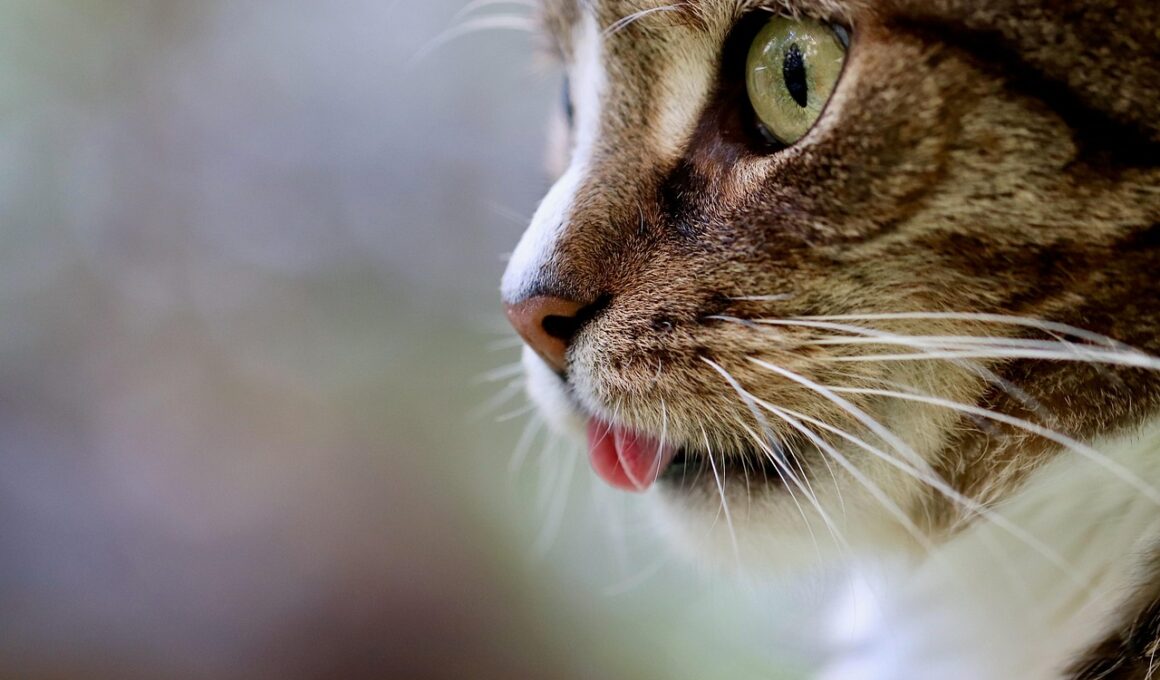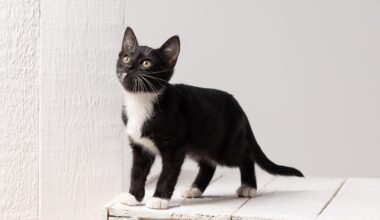Common Questions About Bordetella Vaccine for Cats Answered
The Bordetella vaccine is crucial for protecting cats from Bordetella bronchiseptica, a bacterium responsible for respiratory issues. Many pet owners wonder whether this vaccine is necessary for their cats. The answer largely depends on lifestyle, as cats that frequent boarding facilities, grooming salons, or interact closely with other cats are at higher risk. If your feline is often in environments where they could be exposed to other cats, vaccination is a wise choice. It’s also essential to consult with your veterinarian regarding your cat’s specific needs. They may recommend the vaccine, especially for kittens or those with compromised immune systems, as early vaccination can prevent potential health issues down the road. Remember that not all cats are the same, and factors such as age, health history, and environmental exposure play significant roles in the decision-making process. Always keep open communication with your vet to ensure your feline’s health is prioritized, as feline respiratory diseases can escalate quickly in vulnerable populations. Understanding the necessity of the Bordetella vaccine can lead to more informed choices regarding your furry companions.
A common query among cat parents is how effective the Bordetella vaccine is. Vaccines can significantly reduce the severity and incidence of infectious diseases, including those caused by Bordetella bronchiseptica. While no vaccine offers 100% protection, the Bordetella vaccine helps lower the chances significantly and ensures a healthier lifestyle for your pet. Many cat owners report fewer respiratory infections in vaccinated cats compared to those who remain unvaccinated. However, observations may vary depending on several factors, including the cat’s individual health status and exposure levels. Additionally, feline respiratory viruses can often complicate matters since they can spread easily among cats. It’s important to incorporate this vaccine into a comprehensive wellness plan for your pet, which may also include regular check-ups and other vaccines. Keeping your cat’s vaccinations up to date helps protect not only your pet but also others in your household or neighborhood. When considering the Bordetella vaccine, always discuss any concerns, potential side effects, and the frequency of boosters with your vet, ensuring you understand the overall health implications of vaccination.
Many cat owners often question when their kittens should begin receiving the Bordetella vaccine. Generally, it is advisable to start vaccinations at approximately 8 to 12 weeks of age. Your veterinarian may suggest an initial vaccination followed by a booster a few weeks later. Early vaccination helps establish immunity as kittens are particularly susceptible to infections. Since the Bordetella vaccine requires boosters for maximum effectiveness, your vet will provide a vaccination schedule tailored to your kitten’s needs. It’s essential to monitor for potential side effects following vaccination. Common reactions may include mild fever, fatigue, or soreness at the injection site. These symptoms generally resolve quickly. If you notice any severe reactions like difficulty breathing or swelling, contact your veterinarian immediately. All cats, regardless of breed or lifestyle, can benefit from early vaccination as it sets the stage for healthier lives moving forward. Partnering with your vet to keep a consistent vaccination schedule is crucial for your kitten’s long-term health, ensuring they remain safe from contagious and potentially serious respiratory ailments that could impact their quality of life.
Who Should Get the Bordetella Vaccine?
It’s vital to determine which cats need the Bordetella vaccine, focusing on risk factors such as lifestyle and exposure. Outdoor cats or those that frequently interact with other felines are prime candidates, as they have heightened exposure to respiratory pathogens. Additionally, cats destined for boarding facilities, in which close proximity to other cats is common, should receive this vaccine prior to their stay. While indoor cats might seem less in need, spikes in respiratory issues can happen even among them due to environmental changes or stress. Discussing your cat’s lifestyle with your vet can help assess their risk factors. If you adopt a new kitten or cat, especially from a shelter or rescue, vaccination status should be verified; if the Bordetella vaccine is not already administered, it might be beneficial to start them on the vaccination schedule to prevent future health complications. Overall, balancing vaccination against community exposure is paramount when considering the Bordetella vaccine, so take proactive steps with guidance from your veterinarian to ensure your cat’s safety.
Many people have questions about the safety of the Bordetella vaccine for cats, and it’s crucial to address those concerns. Like all vaccines, the Bordetella vaccine undergoes extensive testing to ensure safety and efficacy before being approved for use. Although side effects can occur, they are usually brief and mild, such as slight swelling at the injection site or mild lethargy. Severe reactions are rare but can happen, as with any vaccine. It’s essential to discuss any concerns with your veterinarian before vaccination. They can give insights into your cat’s health history to anticipate any possible reactions. Regular monitoring is also a good practice post-vaccination; keeping a close eye on your cat after the shot can help you identify any unexpected reactions quickly. Most cats tolerate the vaccine well instead of developing serious issues, underscoring its importance in maintaining health within multi-cat households and communities. Vaccination programs utilize preventative medicine principles; by offering this vaccine, you’re investing in your cat’s long-term health and reducing the overall risk of respiratory illnesses in your pets.
Another common question regarding the Bordetella vaccine is whether it’s necessary for older cats. While older cats might have developed some immunity to certain illnesses over time, they can still benefit significantly from vaccination. Their immune systems may not be as robust, making them more susceptible to infections compared to younger cats. Factors such as underlying health issues or chronic conditions can also heighten the risk for older felines. Regular veterinary assessments of your senior cat’s health will aid in determining an appropriate vaccination approach. If they’ve been exposed to situations where they could contract Bordetella, then vaccination becomes increasingly important. Keeping vaccinations up to date helps ensure a robust immune response, granting better protection. Boosters may be suggested more frequently for older cats to maintain immunity levels adequately. Therefore, when debating whether older cats should receive the Bordetella vaccine, consider consulting your veterinarian. They will assist in evaluating your cat’s health status, discussing risk factors, and ultimately deciding the appropriateness and timing of the vaccine based on individual circumstances.
Conclusion on Bordetella Vaccination for Cats
Understanding the importance and functionality of the Bordetella vaccine provides peace of mind for cat owners. Bottom line: vaccinations are foundational to good health practices for your pets. Being informed about vaccines safeguards not only your cat but also contributes to the wellbeing of other felines in your community. Vaccination greatly minimizes the risk of respiratory diseases which can spread easily among close contacts, particularly in shared living situations. This proactive approach promotes a healthier environment overall. Regularly review vaccination records with your vet, addressing any changing needs as your cat ages. Also, ensure that any kittens in the household receive their vaccinations on schedule to lay a solid foundation for a healthy life. Whether considering requiring them for travel, boarding, or grooming, the Bordetella vaccine is critical for those cats at risk. By following recommend vaccination schedules, each cat’s health can be optimized through preventative care. You’re taking important steps towards ensuring longevity and quality of life for your beloved feline companions. A collaborative approach between pet owners and veterinarians establishes a strong line of defense against various infectious diseases.
In addition to vaccination, other preventive health measures remain fundamental for maintaining feline health. Regular veterinary check-ups, providing a balanced diet, and ensuring proper exercise all play essential roles in supporting an immune system strong enough to fight off potential infections. Socializing cats beneficially within their environment also contributes to a more robust immune response over time. Engaging with your cat and monitoring their habits will help notice any behavioral changes or health issues early. It’s vital to provide a safe environment that limits exposure to potential threats. Talking with your veterinarian about appropriate preventative measures can further enhance your feline’s health strategy. Together, vaccinations and good lifestyle choices create comprehensive protection for your furry family member. Keep in mind that veterinary care is an ongoing process, and adapting to the unique health needs of your cat is crucial for their well-being. Preventative health measures complement the Bordetella vaccine, ensuring minimal risk of respiratory infections while maximizing your cat’s overall health. Integrating lifestyle adjustments, a nutrient-rich diet, and appropriate exercise will make a profound difference in safeguarding their vitality.


